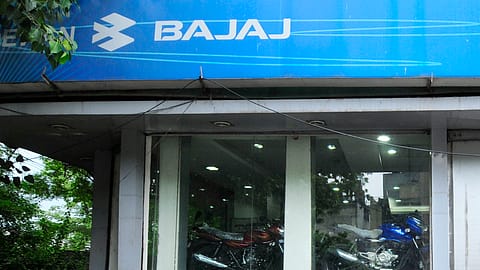Bajaj Auto Q4 net profit falls 2% to ₹1,433 crore
Revenue from operations rose 12% to ₹8,905 crore for the January-March quarter.

Net profit of two-wheeler maker Bajaj Auto Ltd dropped 2% year-on-year to ₹1,433 crore for the quarter ended March as exports worsened amid the deteriorating macroeconomic conditions across overseas markets.
Revenue from operations rose 12% to ₹8,905 crore for the January-March quarter compared with ₹7,975 crore in the corresponding period last year.
The automaker's revenue growth was led by the sustained momentum of the domestic business that delivered strong volume-led revenue growth of over 50% year-on-year, as per the company's stock exchange filing.
Better foreign exchange realisation, judicious pricing, and a richer product mix all helped offset the drop in overall volumes arising from sluggish exports, the filing says.
Operating profit or earnings before interest, taxes, depreciation, and amortization (EBITDA) jumped 26% to ₹1,718 crore in Q4 FY23. Operating margin stood at 19.3% compared with 19.1% last year.
"Sequentially across quarters, price realisation and material costs held flat with favourable mix driving the slight uptick," the two-wheeler maker says.
Domestic motorcycle sales continued to deliver well, buoyed by the strong performance of the Pulsar portfolio and further scale-up in Platina 110 ABS volumes, the filing says. The latest re-launch of Pulsar NS160 and NS200 along with launches earlier in the year is enabling the acceleration of Bajaj Auto’s market share in the 125cc-plus segment, it adds.
Recommended Stories
Three-wheeler sales crossed the 100,000 units milestone for the first time since the pandemic, the filing notes.
"While exports progressively worsened given the deteriorating macros across overseas markets, a close watch on developments and decisive actions to salvage volumes ensured that our competitiveness was intact with overall market share holding steady," the automaker says.
For the full fiscal year, revenue from operations grew 10% year-on-year to ₹36,428 crore. This, according to the company, was despite constrained supplies early on and particularly challenging overseas markets for the most part of the year. Spares revenue registered an all-time high. Sustained momentum on the domestic front led to strong double-digit revenue growth, which more than made up for the setback on exports arising from sluggish markets, says Bajaj Auto.
The company's board of directors recommended a final dividend of ₹140 per share, amounting to about ₹3,961 crore. This, along with the share buyback that was concluded earlier in the year will add up to almost ₹7,055 crore of cash being paid to shareholders.
(INR CR)
The automaker had a surplus cash of around ₹17,445 crore as of March 31, 2023.
The quarter also saw Bajaj and Yulu launch their new electric two-wheeler platform built for Indian urban mobility.